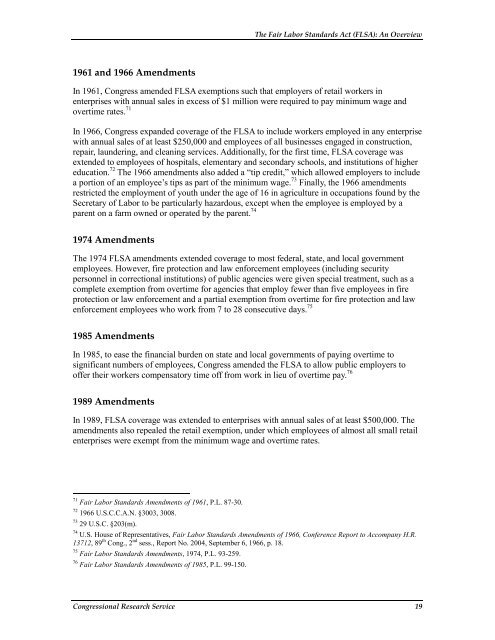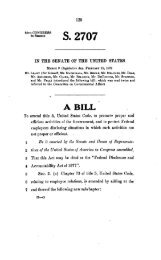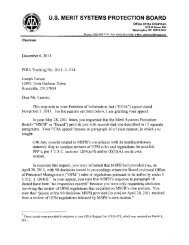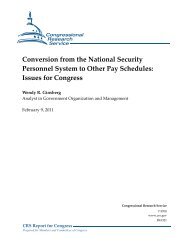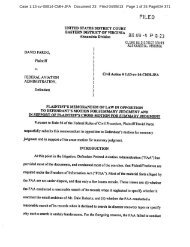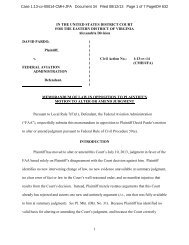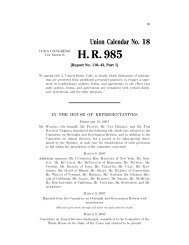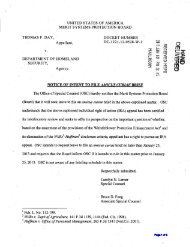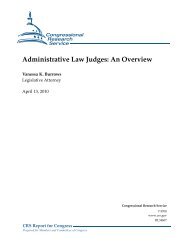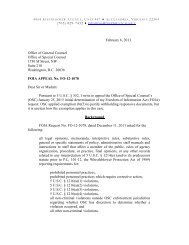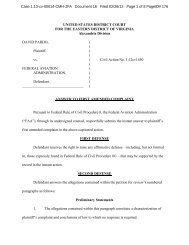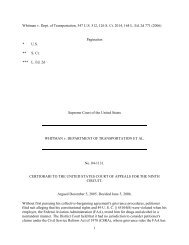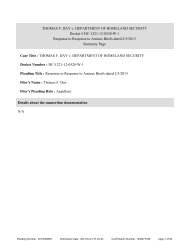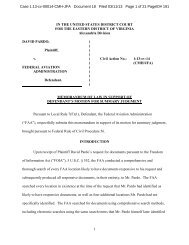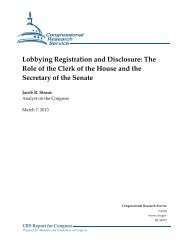The Fair Labor Standards Act (FLSA): An Overview - MSPB Watch
The Fair Labor Standards Act (FLSA): An Overview - MSPB Watch
The Fair Labor Standards Act (FLSA): An Overview - MSPB Watch
You also want an ePaper? Increase the reach of your titles
YUMPU automatically turns print PDFs into web optimized ePapers that Google loves.
<strong>The</strong> <strong>Fair</strong> <strong>Labor</strong> <strong>Standards</strong> <strong>Act</strong> (<strong>FLSA</strong>): <strong>An</strong> <strong>Overview</strong>1961 and 1966 AmendmentsIn 1961, Congress amended <strong>FLSA</strong> exemptions such that employers of retail workers inenterprises with annual sales in excess of $1 million were required to pay minimum wage andovertime rates. 71In 1966, Congress expanded coverage of the <strong>FLSA</strong> to include workers employed in any enterprisewith annual sales of at least $250,000 and employees of all businesses engaged in construction,repair, laundering, and cleaning services. Additionally, for the first time, <strong>FLSA</strong> coverage wasextended to employees of hospitals, elementary and secondary schools, and institutions of highereducation. 72 <strong>The</strong> 1966 amendments also added a “tip credit,” which allowed employers to includea portion of an employee’s tips as part of the minimum wage. 73 Finally, the 1966 amendmentsrestricted the employment of youth under the age of 16 in agriculture in occupations found by theSecretary of <strong>Labor</strong> to be particularly hazardous, except when the employee is employed by aparent on a farm owned or operated by the parent. 741974 Amendments<strong>The</strong> 1974 <strong>FLSA</strong> amendments extended coverage to most federal, state, and local governmentemployees. However, fire protection and law enforcement employees (including securitypersonnel in correctional institutions) of public agencies were given special treatment, such as acomplete exemption from overtime for agencies that employ fewer than five employees in fireprotection or law enforcement and a partial exemption from overtime for fire protection and lawenforcement employees who work from 7 to 28 consecutive days. 751985 AmendmentsIn 1985, to ease the financial burden on state and local governments of paying overtime tosignificant numbers of employees, Congress amended the <strong>FLSA</strong> to allow public employers tooffer their workers compensatory time off from work in lieu of overtime pay. 761989 AmendmentsIn 1989, <strong>FLSA</strong> coverage was extended to enterprises with annual sales of at least $500,000. <strong>The</strong>amendments also repealed the retail exemption, under which employees of almost all small retailenterprises were exempt from the minimum wage and overtime rates.71 <strong>Fair</strong> <strong>Labor</strong> <strong>Standards</strong> Amendments of 1961, P.L. 87-30.72 1966 U.S.C.C.A.N. §3003, 3008.73 29 U.S.C. §203(m).74 U.S. House of Representatives, <strong>Fair</strong> <strong>Labor</strong> <strong>Standards</strong> Amendments of 1966, Conference Report to Accompany H.R.13712, 89 th Cong., 2 nd sess., Report No. 2004, September 6, 1966, p. 18.75 <strong>Fair</strong> <strong>Labor</strong> <strong>Standards</strong> Amendments, 1974, P.L. 93-259.76 <strong>Fair</strong> <strong>Labor</strong> <strong>Standards</strong> Amendments of 1985, P.L. 99-150.Congressional Research Service 19


